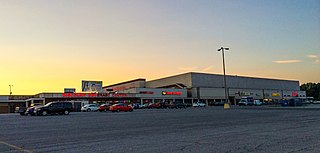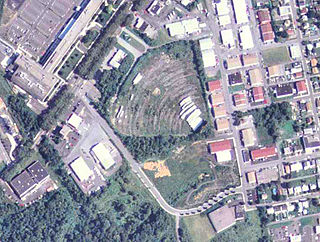
Allentown is the county seat of Lehigh County, Pennsylvania, United States. It is the third-most populous city in Pennsylvania with a population of 125,845 as of the 2020 census and the most populous city in the Lehigh Valley metropolitan area, which had a population of 861,899 and was the 68th-most populous metropolitan area in the nation as of 2020.

Hess's, originally known as Hess Brothers, was a department store chain based in Allentown, Pennsylvania. The company was founded a single store in 1897, and grew to nearly 80 stores by its commercial peak in the late 1980s. The chains stores were closed or sold off in a series of deals in the early to mid-1990s.
The Indian Hills Theater in Omaha, Nebraska, United States, was a movie theater built in 1962 showcasing films in the Cinerama wide-screen format. Its location was at 8601 West Dodge Rd. The theater's screen was the largest of its type in the United States. Despite the protests of local citizens, Hollywood legends, and the National Trust for Historic Preservation, the theater was demolished in 2001 by Nebraska Methodist Health System for a parking lot.

Valley View Mall is an 800,000-square-foot (74,000 m2) regional shopping mall located in the Roundhill neighborhood of Roanoke, Virginia. It is located near the interchange of Interstate 581/U.S. Route 220 with Hershberger Road in the northwest section of the city.

A multiplex is a movie theater complex with multiple screens or auditoriums within a single complex. They are usually housed in a specially designed building. Sometimes, an existing venue undergoes a renovation where the existing auditoriums are split into smaller ones, or more auditoriums are added in an extension or expansion of the building. The largest of these complexes can sit thousands of people and are sometimes referred to as a megaplex.

Miller Symphony Hall is a 1,100-seat performing arts facility in Allentown, Pennsylvania that hosts the Allentown Symphony Orchestra. The hall was previously known as Central Market (1896), Lyric Theater (1899), and Allentown Symphony Hall (1959). In 2012, it was renamed for the Miller family, longtime owners of the hall and of The Morning Call newspaper.

The Capitol Theatre is a theatre operating in Rome, New York. It opened December 10, 1928 as part of the Kallet chain of movie houses, presenting first run films until it closed in 1974. After extensive renovation, the theatre re-opened in 1985 as the non-profit Capitol Civic Center, offering classic films, live theatrical performances, and concerts.

The Civic Theatre of Allentown, also known as the Nineteenth Street Theatre, is the oldest cinema in Allentown, Pennsylvania. The theater opened on September 17, 1928. It hosts live theater, educational programs, and screens art house films. In July 1957, the property was purchased by Allentown's Civic Little Theatre. Since then, stage productions have been performed at the theater. In 1994 the company officially changed its name to the Civic Theatre of Allentown. Its building on 19th Street was listed on the National Register of Historic Places in 2024.
The Boyd Theatre was a 1920s era movie palace in Center City Philadelphia, Pennsylvania. It operated as a movie theater for 74 years, operating under the name Sameric as part of the United Artists theater chain, before closing in 2002. The theater was the last of its kind in downtown Philadelphia, a remnant of an era of theaters and movie palaces that stretched along Market and Chestnut Streets. The Boyd's auditorium was demolished in the 2015 by its owner Pearl Properties, which planned to replace it with a 24-story residential tower.

Eastwood Towne Center is an open-air shopping mall and lifestyle center located in Lansing Charter Township, Michigan, United States at the northwest corner of the intersection of Lake Lansing Road and U.S. 127. Its anchor stores include NCG Cinemas, Dick's Sporting Goods, DSW Shoe Warehouse, and Pottery Barn. The center is owned, managed, and leased by Kite Realty Group Trust.

The Orpheum Theatre is a live performance and musical theater built in the 1920s as a movie palace in downtown Madison, Wisconsin, located one block from the Wisconsin State Capitol. In 2008 the Orpheum was added to the National Register of Historic Places as Madison's best surviving representative of the movie palace era.

The Barrymore Theatre is a 971-capacity live music venue on the east side of Madison, Wisconsin. Originally built as the Eastwood Theater in 1929, the Barrymore was founded by Richard "Sich" Slone and Tom Peterson in 1987 in an attempt to revive Madison's declining Schenk-Atwood neighborhood. The theater has hosted almost 3,000 shows and events including rock concerts, films, plays, dance recitals, broadcasts, political rallies, children's programming, and community events. Today the Barrymore is owned by the Schenk-Atwood Revitalization Association with Steve Sperling as general manager. It is an independent, community-based theater, owned by a nonprofit corporation.

The Tri-State Mall was a shopping mall located on Delaware Route 92 in Claymont, Delaware. The mall was closed in November 2015. At 535,000 square feet (49,700 m2), it was the state's fourth-biggest mall, with approximately fifty shops. It is located just off of Interstate 95 and is less than a mile from the Pennsylvania/Delaware border. By 2017, the only anchor store left was Burlington Coat Factory with a space previously occupied by Kmart still vacant. A large percentage of shoppers are from Pennsylvania, wishing to take advantage of Delaware's tax free shopping.

The Tower Theatre for the Performing Arts is a historic Streamline Moderne mixed-use theater in Fresno, California. Built in 1939, it opened to the public on December 15, 1939, under the management of Fox West Coast Theater Corporation. The building was designed by S. Charles Lee, with its tower inspired by the "Star Pylon" at the 1939 New York World's Fair. The theater underwent a renovation and reopened as a performing arts center in 1990, after being closed as a repertory cinema in 1989 due to financial troubles.

The Boulevard Drive-In Theater is a closed drive-in theater, located in Allentown, Pennsylvania. It was one of two drive-in theaters in Allentown; the second one was Cinema Treasures.

The Colonial Theater was a former cinema and stage theater in Allentown, Pennsylvania, United States. Opened in 1920, for over 50 years it was considered the glamour cinema in the central business district. It closed in 1982, and was torn down in 2005 after years of being vacant and deteriorated. The site has been redeveloped as Three City Center, part of the Allentown Neighborhood Improvement Zone (NIZ).
The Allen Theater is a former cinema in Allentown, Pennsylvania. It opened in 1915 and closed in 1989.

The Farr Building is a historic office building in Allentown, Pennsylvania. The building, which opened in 1907, is currently used as retail and residential space.

The Mayfair Theatre, also known as the Auditorium Theatre and Auditorium Music Hall, is a historic theatre site in Baltimore, United States. Originally opened in 1880 as a bathing house, the site was later demolished and rebuilt in 1904 as a theatre, which was closed in 1986.

















